April Ashley, transgender icon: Liverpool exhibition opens
- Published
.jpg)
As a model, April Ashley was photographed by David Bailey and featured in the pages of Vogue magazine
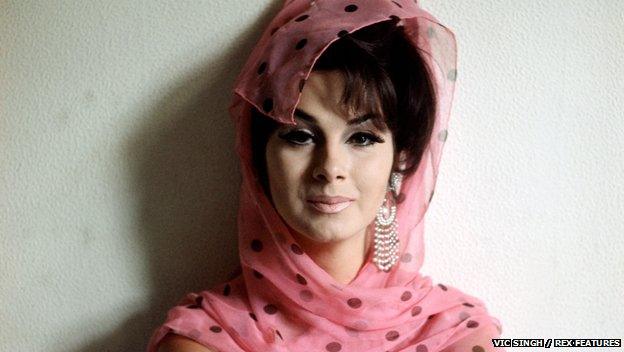
April worked in a Paris nightclub to earn money for the gender reassignment surgery in Casablanca in 1960. She was one of the first British people to undergo the surgery
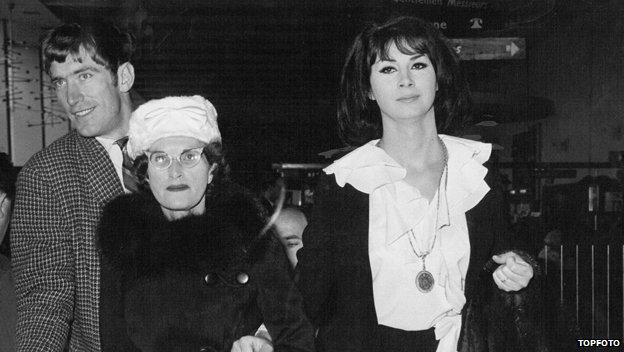
April was betrayed by a friend in 1961 and never worked again as a model in the UK. She is seen here arriving at the airport in London with her mother.
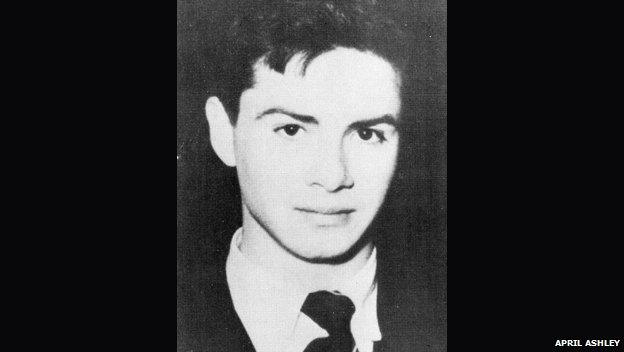
George Jamieson as a 17-year-old before she became April
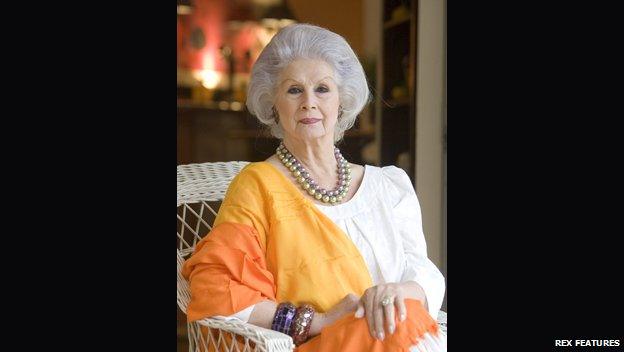
April Ashley has campaigned for years for a change in the way society treats transgender people.
A year-long exhibition opens at Liverpool Museum on Friday dedicated to the astonishing life of April Ashley. It examines how one of the first British people to undergo gender reassignment surgery helped to change society.
In 1961 April Ashley was a sought-after model who had been photographed by David Bailey and featured in the pages of Vogue magazine.
April, then 26, had only had gender reassignment surgery in Morocco the year before, a pioneering operation she was one of the first British people to undergo.
But the joy at her successful transition was not to last. Later in 1961 she was betrayed by a friend who sold her story to the Sunday People for £5.
She never worked as model again in Britain.
Although she would continue to suffer prejudice and discrimination in the decades that followed, eventually Miss Ashley was recognised for her tireless work on behalf of the transgender community, and in December was made an MBE for her efforts.
The exhibition focusing on her extraordinary journey from George Jamieson to April Ashley MBE draws on her own photographic archive and documents to look at the wider impact of changing social and legal conditions for all lesbian, gay, bisexual and transgender people.
Electric shock treatment
Featuring personal histories captured by the Homotopia project, it records and reflects shifting social attitudes to gender and sexuality, telling individual stories and looking at the impact April had on the movement as it moved from marginalisation and prejudice to inclusion and equality.
Exhibition for transgender campaigner and former model
Gary Everett, director of Homotopia and exhibition curator, said it was "remarkable" April returned to Britain after such an unhappy start to her life to achieve success as a model and actress.
Part of the exhibition recreates the Parisian nightclub where she worked to save up the money to pay for the surgery.
'Au revoir, monsieur'
Mr Everett said: "It was all the more shocking then, when her story became a public scandal when she was 'outed' as transsexual by the Sunday People.
"April has had an astonishing life but throughout it all she has fought for her rights, and provided advice and support for those suffering similar discrimination."
Born George Jamieson in Liverpool in 1935, she grew up wishing she would wake up a girl.
She joined the Merchant Navy at 14 to escape her miserable home life and confusion surrounding her gender.
Twice she tried to take her life and was admitted to a mental institution for electric shock treatment. "I knew that if I were to live it could only be as a woman," she said.
She moved to Paris and worked in La Carrousel nightclub, earning enough money for the operation.
She said: "It was incredibly glamorous because we had all the movie stars and Elvis was very flirtatious with me until Colonel Parker pulled him aside one night and said: 'No, you stay away.'
"The moment I knew it was possible to have a operation I saved every single penny. The morning I woke up after the operation to me was the happiest day of my life," she said.
"I still wake up in the morning with a little sense of joy of that moment."
The operation was carried out at a clinic in Casablanca by Dr Georges Burou. She was his ninth patient.
As she lost consciousness she recalled the doctor saying: "Au revoir, monsieur," and when she awoke, she heard: "Bonjour, mademoiselle."
'Behaved so abominably'
However, life as a woman was not an easy one.
She recalled how people used to poke her, asking if her breasts were real, and would pull her hair.
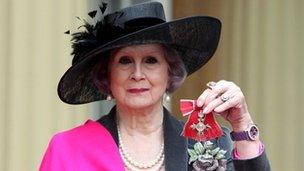
April Ashley was made an MBE in 2012 for her campaigning work for the transgender community
April said: "They behaved in such a way that in the end you wondered who was the freak - you or them: they behaved so abominably."
She was often in the headlines. Her divorce from Arthur Corbett in 1970 after a judge ruled that she remained a biological man and the marriage therefore was invalid brought more publicity for her.
But April continued to battle against adversity and went on to witness some important changes in the way society treats transgender people.
When in 1999 the right of transgender people to change their status on official documents was established in law she said: "I feel free at last."
Reflecting on her life in a BBC interview, April said: "Once you become an institution you become respectable again. What happens in between is another story."
Janet Dugdale, director of the Museum of Liverpool, said: "As one of Britain's first transsexual women to undergo gender reassignment surgery, April Ashley's story - which began in this, her home city - has had a tremendous impact on the trans community and people across the globe.
"The exhibition is internationally important and we will share April's story along with experiences of transgender people during the last 70 years."
- Published13 December 2012